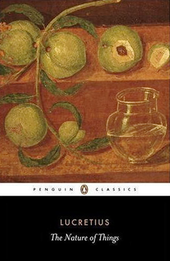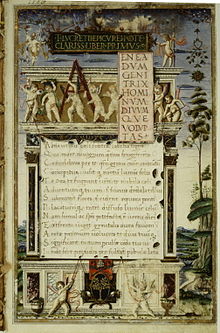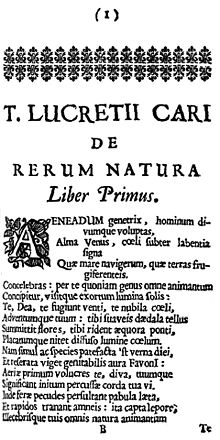- De rerum natura
-
"On the Nature of Things" redirects here. For the documentary television series, see The Nature of Things.
 Penguin Books' Classic edition of De rerum natura, under the title The Nature of Things, translated by A. E. Stallings
Penguin Books' Classic edition of De rerum natura, under the title The Nature of Things, translated by A. E. Stallings
De rerum natura (On the Nature of Things) is a 1st century BC didactic poem by the Roman poet and philosopher Lucretius with the goal of explaining Epicurean philosophy to a Roman audience. The poem, written in some 7,400 dactylic hexameters, is divided into six untitled books, and explores Epicurean physics through richly poetic language and metaphors.[1] Lucretius presents the principles of atomism; the nature of the mind and soul; explanations of sensation and thought; the development of the world and its phenomena; and explains a variety of celestial and terrestrial phenomena. The universe described in the poem operates according to these physical principles, guided by fortuna, "chance," and not the divine intervention of the traditional Roman deities.[2]
Contents
Synopsis
 Opening of De rerum natura, 1483 copy by Girolamo di Matteo de Tauris for Pope Sixtus IV
Opening of De rerum natura, 1483 copy by Girolamo di Matteo de Tauris for Pope Sixtus IV
Lucretius wrote this epic poem to "Memmius", who may be the Gaius Memmius who in 58 BC was a praetor, a judicial official deciding controversies between citizens and the government. There are over a dozen references to "Memmius" scattered throughout the long poem in a variety of contexts in translation, such as "Memmius mine", "my Memmius", and "illustrious Memmius". Apparently, Lucretius wrote On the Nature of Things in an attempt to convert Gaius Memmius to atomism, but was unsuccessful.
Epicurus maintained that the unhappiness and degradation of humankind arose largely from the dread which they entertained of the power of the Gods, from terror of their wrath, which was supposed to be displayed by the misfortunes inflicted in this life, and by the everlasting tortures which were the lot of the guilty in a future state, or where these feelings were not strongly developed, from a vague dread of gloom and misery after death. To remove these fears, and thus to establish tranquillity in the heart, was the purpose of his teaching. Thus the Gods, whose existence he did not deny, lived forevermore in the enjoyment of absolute peace, strangers to all the passions, desires, and fears, which agitate the human heart, totally indifferent to the world and its inhabitants, unmoved alike by their virtues and their crimes. To prove this position he called upon the atomism of Democritus, by which he sought to demonstrate that the material universe was formed not by a Supreme Being, but by the mixing of elemental particles which had existed from all eternity governed by certain simple laws. The task undertaken by Lucretius was to clearly state and fully develop these views in an attractive form; his work being an attempt to show that everything in nature can be explained by natural laws without the need for the intervention of divine beings.[3]
Contents
The poem opens with a magnificent invocation to Venus, whom he addresses as an allegorical representation of the reproductive power, after which the business of the piece commences by an enunciation of the great proposition on the nature and being of the gods, which leads to a grand invective against the gigantic monster superstition, and a thrilling picture of the horrors which attends its tyrannous sway. Then follows a lengthened elucidation of the axiom that nothing can be produced from nothing, and that nothing can be reduced to nothing (Nil fieri ex nihilo, in nihilum nil posse reverti); which is succeeded by a definition of the Ultimate Atoms, infinite in number, which, together with Void Space (Inane), infinite in extent, constitute the universe. The shape of these corpuscules, their properties, their movements, the laws under which they enter into combination and assume forms and qualities appreciable by the senses, with other preliminary matters on their nature and affections, together with a refutation of objections and opposing hypotheses, occupy the first two books.[3]
In the third book, the general concepts proposed thus far are applied to demonstrate that the vital and intellectual principles, the Anima and Animus, are as much a part of us as are our limbs and members, but like those limbs and members have no distinct and independent existence, and that hence soul and body live and perish together; the argument being wound up by a magnificent exposure of the folly manifested in a dread of death, which will for ever extinguish all feeling.[3]
The fourth book – perhaps the most ingenious of the whole – is devoted to the theory of the senses, sight, hearing, taste, smell, of sleep and of dreams, ending with a disquisition upon love and sex.[3]
The fifth book, generally regarded as the most finished and impressive, treats of the origin of the world and of all things that are therein, of the movements of the heavenly bodies, of the changes of the seasons, of day and night, of the rise and progress of humankind, of society, and of political institutions, and of the invention of the various arts and sciences which embellish and ennoble life.[3]
The sixth book comprehends an explanation of some of the most striking natural appearances, especially thunder, lightning, hail, rain, snow, ice, cold, heat, wind, earthquakes, volcanoes, springs and localities noxious to animal life, which leads to a discourse upon diseases. This in its turn introduces an appalling description of the great pestilence which devastated Athens during the Peloponnesian War, and thus the book closes. The abrupt ending suggests that Lucretius had not finished fully editing the poem before his death.[3]
Manuscript history
Copies of the poem made it by chance into a few libraries in the 9th century before it was rediscovered in January 1417 by Poggio Bracciolini. This copy did not survive, but one by Poggio's friend, Niccolò de' Niccoli, did; it is kept today at the Laurentian Library in Florence ("Codex Laurentianus 35.30"). Machiavelli made a copy early in his life. Molière produced a verse translation which does not survive; John Evelyn translated the first book.[1]
Notable figures who owned copies include Ben Jonson whose copy is is held at the Houghton Library, Harvard; Thomas Jefferson owned at least five Latin editions and English, Italian and French translations. Montaigne's Essays contain almost a hundred quotes from De rerum natura.[1]
Lucretius' physics
Lucretius maintained that he could free humankind from fear of the gods by demonstrating that all things occur by natural causes without any intervention by the gods. Historians of science, however, have been critical of the limitations of his Epicurean approach to science, especially as it pertained to astronomical topics, which he relegated to the class of "unclear" objects.[4]
Thus, he began his discussion by claiming that he would
explain by what forces nature steers the courses of the Sun and the journeyings of the Moon, so that we shall not suppose that they run their yearly races between heaven and earth of their own free will [i.e., are gods themselves] or that they are rolled round in furtherance of some divine plan....[5]
However, when he set out to put this plan into practice, he limited himself to showing how one, or several different, naturalistic accounts could explain certain natural phenomena. He was unable to tell his readers how to determine which of these alternatives might be the true one.[6]
- Let us now take as our theme the cause of stellar movements.
- First let us suppose that the great globe of the sky itself rotates....
- There remains the alternative possibility that the sky as a whole is stationary while the shining constellations are in motion. This may happen
-
- because swift currents of ether ... whirl round and round and roll their fires at large across the nocturnal regions of the sky. Or
- an external current of air from some other quarter may whirl them along in their course. Or
- they may swim of their own accord, each responsive to the call of its own food, and feed their fiery bodies in the broad pastures of the sky.
- One of these causes must certainly operate in our world.... But to lay down which of them it is lies beyond the range of our stumbling progress.[7]
Drawing on these, and other passages, William Stahl considered that "The anomalous and derivative character of the scientific portions of Lucretius' poem makes it reasonable to conclude that his significance should be judged as a poet, not as a scientist."[8]
The swerve
Determinism appears to conflict with the concept of free will. Lucretius attempts to allow for free will in his physicalistic universe by postulating an indeterministic tendency for atoms to swerve randomly (Latin: clinamen). This indeterminacy, according to Lucretius, provides the "free will which livings things throughout the world have."[9]
Notes
- ^ a b c Greenblatt, Stephen (8 August 2011). "The Answer Man – An ancient poem was rediscovered—and the world swerved". The New Yorker (Condé Nast) LXXXVII (23): 28–33. ISSN 0028792X. http://www.newyorker.com/reporting/2011/08/08/110808fa_fact_greenblatt.
- ^ In particular, De rerum natura 5.107 (fortuna gubernans, "guiding chance" or "fortune at the helm"): see Monica R. Gale, Myth and Poetry in Lucretius (Cambridge University Press, 1994, 1996 reprint), pp. 213, 223–224 online and Lucretius (Oxford University Press, 2007), p. 238 online.
- ^ a b c d e f Ramsay, 1867, pp. 829–30
- ^ Lloyd 1973, p. 26; Stahl 1962, pp. 81–3
- ^ Lucretius, v. 76–81
- ^ Alioto 1987, p. 97
- ^ Lucretius, v. 510–533
- ^ Stahl 1962, p. 83
- ^ Lucretius, ii. 251–260
References
- Anthony M. Alioto, (1987), A History of Western Science. Englewood Cliffs, NJ: Prentice-Hall. ISBN 0-13-392390-8
- G. E. R. Lloyd, (1973), Greek Science after Aristotle. New York: W. W. Norton. ISBN 0-393-04371-1
- William Ramsay, "Lucretius" in William Smith (editor), (1867), Dictionary of Greek and Roman Biography and Mythology. Volume 2.
- William Stahl, (1962), Roman Science. University of Wisconsin Press.
Further reading
Translations
- Lucretius. On the Nature of Things: De rerum natura. Anthony M. Esolen, transl. Baltimore: The Johns Hopkins Univ. Pr., 1995. ISBN 0-8018-5055-X
- Lucretius the Way Things Are: The De Rerum Natura. Rolfe Humphries, transl. Bloomington, Indiana: Indiana University Press, 1968. ISBN 0-253-20125-X.
- Lucretius. On the Nature of the Universe. R. E. Latham, transl. London: Penguin Books, 1994. ISBN 0-14-044610-9.
- Lucretius. On the Nature of Things (Loeb Classical Library No. 181). W. H. Rouse, transl., rev. by M. F. Smith. Cambridge, Mass.: Harvard Univ. Pr., 1992, reprint with revisions of the 1924 edition. ISBN 0-674-99200-8.
- Lucretius. On the Nature of Things (Hackett Classics Series). Martin Ferguson Smith, transl. Indianapolis, Ind.: Hackett Publishing Co., 2001. ISBN 0-87220-587-8. (Review; responses to the review)
- Lucretius: The Nature of Things (Penguin Classics). A.E. Stallings, trans. London. Penguin Books, 2007. ISBN 978-0-14-044796-5. Verse translation of De Rerum Natura.
Commentary
- Brown, P. Michael (ed.). Lucretius, De Rerum Natura III. Warminster: Aris & Phillips, 1997. ISBN 0-85668-694-8 (hb). ISBN 0-85668-695-6 (pb). (Review)
- Campbell, Gordon. Lucretius on Creation and Evolution: A Commentary on De Rerum Natura Book Five, lines 772-1104. Oxford: Oxford Univ. Pr., 2003. ISBN 0-19-926396-5. (Review)
- Sympathetic review of Campbell's book. At page 160, the reviewer concludes the following. "Lucretius on Creation and Evolution offers a bold and sophisticated attempt to come to terms with Lucretius' arguments on evolution in the spirit of the poem's most ambitious commentators. It deserves not only consultation but active perusal. I could not agree more with Campbell's commitment to putting Lucretius and Epicureanism into conversation with the present and with our own attempts to figure out where humans belong in a world of chance and impersonal necessity."
- Fowler, Don. Lucretius on Atomic Motion: A Commentary on De Rerum Natura, Book Two, Lines 1–332. Oxford: Oxford Univ. Pr., 2002. ISBN 0-19-924358-1. (Review)
- Gale, Monica R. Lucretius and the Didactic Epic. London: Bristol Classical Pr., 2001. ISBN 1-85399-557-6 (Review)
- Johnson, W.R. Lucretius and the Modern World. London: Duckworth, 2000. ISBN 0-7156-2882-8. (Review)
- Kennedy, Duncan F. Rethinking Reality: Lucretius and the Textualization of Nature. Ann Arbor: Univ. of Michigan Pr., 2002. ISBN 0-472-11288-0. (Review)
- Sedley, David. Lucretius and the Transformation of Greek Wisdom. Cambridge: Cambridge Univ. Pr., 1998. ISBN 0-521-57032-8. (Review)
External links
- Text at thelatinlibrary.com
- Project Gutenberg e-text of an English translation of On The Nature of Things
 Translation of On the Nature of Things public domain audiobook from LibriVox
Translation of On the Nature of Things public domain audiobook from LibriVox- Stanford Encyclopedia of Philosophy article on Lucretius, with extensive discussion of On the Nature of Things
- Summary of On the Nature of Things, by section
- Analysis of Lucretius' "conversion" challenge in terms of designing a "meme" that would compete with the surrounding memes of creationism; "as doctors sweeten bitter medicine with honey", so Lucretius sweetened the conversion pill as poetry.
Epicureanism Philosophers Greek eraEpicurus · Polyaenus · Metrodorus · Batis · Leontion · Carneiscus · Idomeneus · Hermarchus · Colotes · Themista · Leonteus · Polystratus · Dionysius of Lamptrai · Basilides · Philonides · Diogenes of Tarsus · Alcaeus and Philiscus · Apollodorus · Demetrius Lacon · Zeno of SidonRoman eraAmafinius · Rabirius · Titus Albucius · Phaedrus · Philodemus · Lucretius · Patro · Catius · Siro · Diogenes of OenoandaPhilosophy Concepts Works On the Nature of ThingsCategories:- Natural philosophy
- Metaphysics literature
- Cognitive science literature
- Epic poems in Latin
- Epicureanism
- Philosophy books
- Let us now take as our theme the cause of stellar movements.
Wikimedia Foundation. 2010.

